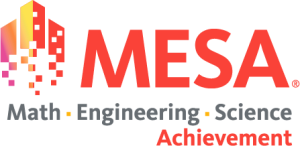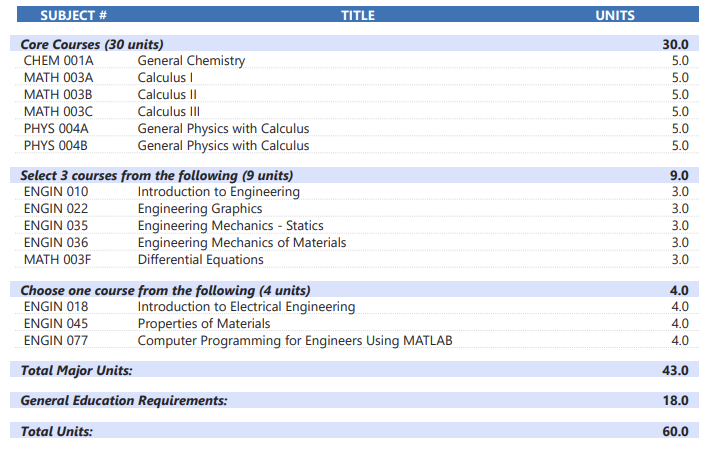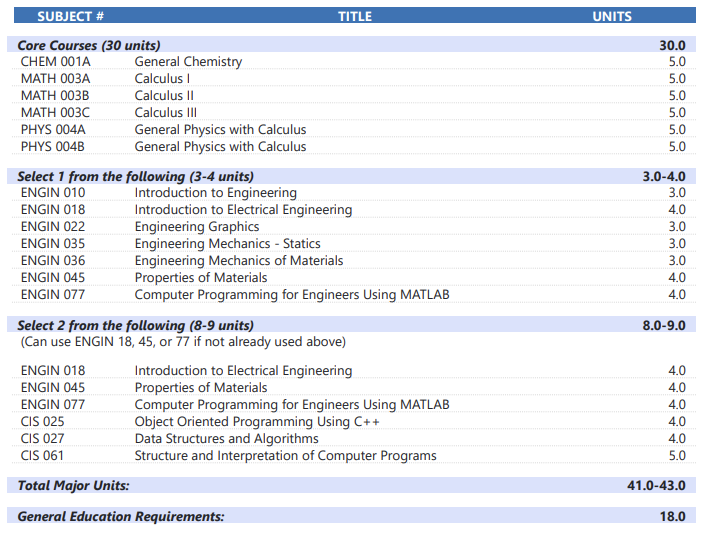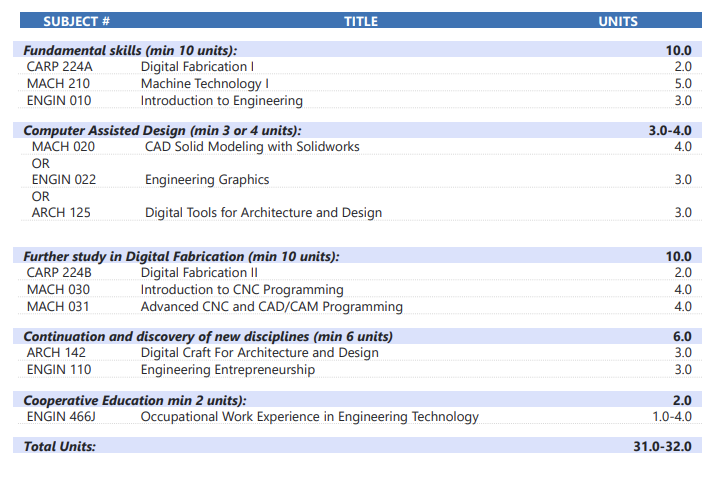Associate Degree
Engineering – A.S. Degree
Engineers apply the theories and principles of science and mathematics to solve real world problems. The engineering major provides a solid foundation in math, science, and engineering concepts, and prepares students looking to transfer to obtain their Bachelor’s degree or looking to enter the field as an engineering technician. This degree is appropriate for students looking to enter most engineering disciplines, including mechanical engineering, civil engineering, and aerospace engineering. Engineers in these disciplines work in a wide variety of industries including renewable energy, robotics, environmental management, structural design, automotive design, and transportation. Students looking to enter computer or electrical engineering, should look at the
Engineering – Computer and Electrical A.S. degree. If planning to transfer to a 4-year university, please see a counselor for more information.
Program Learning Outcomes
Upon completion of this program a student will be able to:
1. Use engineering analysis to formulate logical problem solving approaches, generate solutions, and assess the reasonableness of the solutions
2. Design, construct, and produce creative solutions to engineering problems by applying the engineering design process
3. Apply scientific principles and mathematical analysis to solve science, math, and engineering problems
Career Opportunities
Engineering continues to be an excellent choice for a career. It is the second largest profession, being exceeded only by teaching. Careers in engineering include: mechanical engineers, civil engineers, aerospace engineers, product developers, roboticists, water resources engineers, materials scientists, biomedical engineers, renewable energy engineers, chemical engineers, quality control engineers, researchers, engineering teachers, and project managers.
Engineering – Computer and Electrical – A.S. Degree
Engineers apply the theories and principles of science and mathematics to solve real world problems. The engineering major provides a solid foundation in math, science, and engineering concepts, and prepares students looking to transfer to obtain their Bachelor’s degree in electrical or computer engineering, or looking to enter the field as an engineering technician. Engineers in the electrical or computer fields work in a wide variety of industries including renewable energy production, computer hardware, environmental controls, signal processing, product design, and machine learning. If planning to transfer to a 4-year university, please see a counselor for more information.
Program Learning Outcomes
Upon completion of this program a student will be able to:
1. Use engineering analysis to formulate logical problem solving approaches, generate solutions, and assess the reasonableness of the solutions
2. Design, construct, and produce creative solutions specific to the electrical and computer engineering field
3. Apply scientific principles and mathematical analysis to solve science, math, and engineering problems
Career Opportunities
Engineering continues to be an excellent choice for a career. It is the second largest profession, being exceeded only by teaching. Careers in computer and electrical engineering include: computer engineers, electrical engineers, product developers, roboticists, researchers, engineering teachers, and project managers.
Certificate of Achievement
Digital Fabrication Technology – Design and Engineering – Certificate of Achievement
Laney College’s Engineering and Design focused Digital Fabrication Technology Program prepares graduates for modern Digital Fabrication and Advanced Manufacturing careers in design firms, engineering firms, furniture, cabinet, industrial art, custom installation and parts manufacturing shops. These multi-disciplinary courses emphasize and expand on the fundamentals of computer-assisted design (CAD) and computer-assisted manufacturing (CAM) techniques. Students will learn intermediate and advanced skills in iterative, design oriented thinking by employing rapid prototyping philosophy framed within a creative problem solving mindset. Graduates will leave with the ability to: conceptualize a project, 3D model it in its entirety, create the project using computer numerically controlled (CNC) and advanced manufacturing equipment, rapidly analyze and improve a project through iteration, and finish a project using modern and hand techniques. Engineering and design based thinking will frame the way students approach projects and problems, using skills and techniques in those disciplines to guide solution based problem solving.
Program Learning Outcomes
Upon completion of this program a student will be able to:
1. Safety - Demonstrate proper safety protocols of all tools and equipment in the classroom .
2. Skills - Students will be able to use modern industrial computer numerically controlled (CNC) equipment to produce projects and apply improvements within the prototyping process using engineering and design principles.
3. Materials and Practices - Students will identify, analyze, evaluate and apply the correct materials to the
appropriate production parameters creating efficient work flows for projects with optimal material use.
Career Opportunities
CNC operator, CNC programmer, Part designer, Fabricator, CAD/CAM specialist, Design and fabrication consultant, 3D printer operator, Digital Fabrication technician and Production assistant








